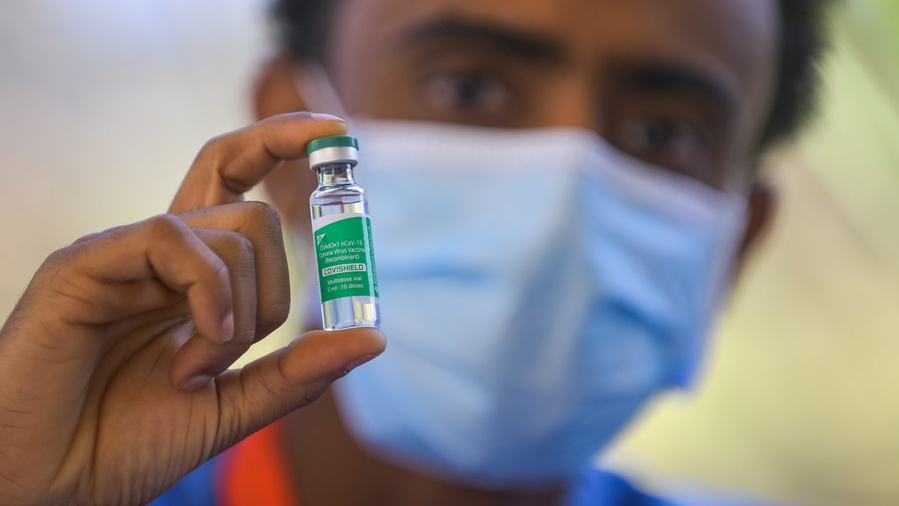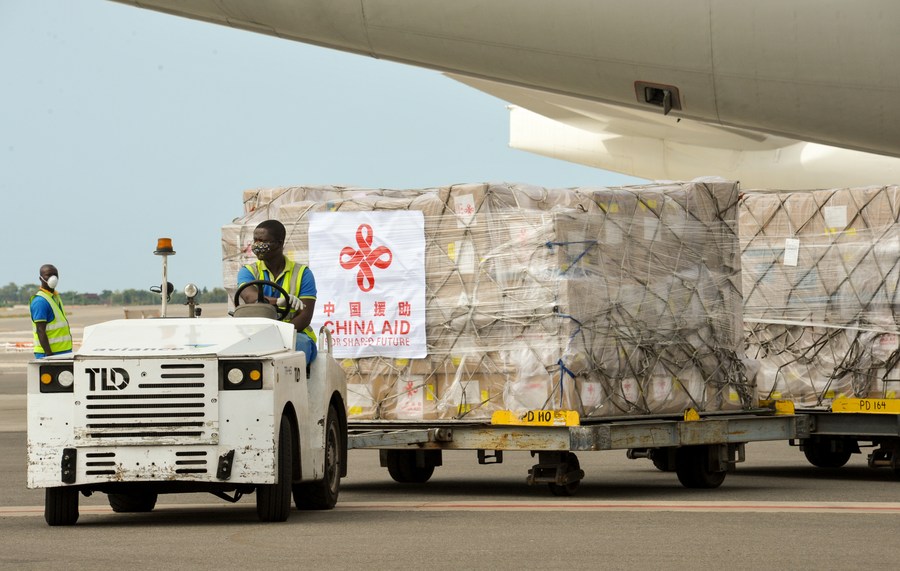
A medical worker shows a vial of the COVID-19 vaccine in Addis Ababa, Ethiopia, March 13, 2021. /Xinhua
A medical worker shows a vial of the COVID-19 vaccine in Addis Ababa, Ethiopia, March 13, 2021. /Xinhua
Editor's note: Andrew Korybko is a Moscow-based American political analyst. The article reflects the author's views and not necessarily those of CGTN.
The World Health Organization (WHO) declared the novel coronavirus popularly known nowadays as COVID-19 a public health emergency of international concern two years ago on 30 January 2020. It's understandable that most people have lost track of time because so much has happened since then. Everyone's lives have been completely altered in one way or another, whether through sickness, lockdown, and/or the economic consequences of the world's uncoordinated containment of the virus.
What few have drawn attention to, however, is the continued vaccine inequality that still afflicts Africa. United Nations (UN) Secretary-General Antonio Guterres recently talked about this when mentioning that richer nations have vaccination rates several times higher than developing ones. As of December 2021, just 8.6 percent of Africans were fully vaccinated according to The Washington Post. At the present rate, Africa isn't expected to hit the 70 percent threshold of vaccinated people until August 2024 at the very earliest.
Critics have described this as "vaccine apartheid" and speculated that Africa is being purposely neglected when it comes to vaccines. That's indeed possible since those economically developed nations that produce many of the world's vaccines have a self-interest in hoarding these epidemiological wares for themselves and their own people. Comparatively poorer African nations cannot afford the excess expenses unexpectedly required to purchase vaccines for all of their people.
Another challenge is some local attitudes towards vaccination. Uganda recently had to destroy about 0.4 million doses of Moderna's COVID-19 vaccines because they expired after people in the Acholi sub-region remained reluctant to get vaccinated. This issue isn't exclusive to Uganda but is prevalent across other African countries too. Observers suspect that anti-vaccination campaigns have influenced the locals and convinced them not to get inoculated.

A staff member unloads Chinese medical supplies from an airplane at the Kotota International Airport in Accra, capital of Ghana, April 6, 2020. /Xinhua
A staff member unloads Chinese medical supplies from an airplane at the Kotota International Airport in Accra, capital of Ghana, April 6, 2020. /Xinhua
As Africa's "vaccine apartheid" continues, it'll take longer for the continent to economically recover from the consequences of the international community's uncoordinated efforts to contain COVID-19. That's because most countries are requiring some level of vaccination for all visitors, including foreign business-people. Non-African investors might also feel reluctant to travel to the continent if they fear that many of those around them aren't vaccinated even if they themselves are inoculated.
Not only that, but people's lives are also obviously at risk too. It's a wonder that so few people have reportedly died in Africa because of COVID-19. The international community is very concerned that the continent's luck might run out if a new viral strain ravages Africa. That's why so many are encouraging Africans to get vaccinated out of an abundance of caution, but "vaccine apartheid" and local resistance are complicating those efforts.
As the world's largest developing country, China feels responsible for ensuring the safety of its fellow Global South nations' people. That's why President Xi Jinping declared last November while addressing the Eighth Ministerial Conference of the Forum on China-Africa Cooperation that China will provide another one billion doses to Africa. He repeated this pledge while speaking at the World Economic Forum in mid-January, adding that 600 million of these promised doses will be provided as a donation.
This represents the greatest commitment of any country in the world to remedying the problem of vaccine inequality. Africa will be safer and healthier as a result, which will in turn enable it to accelerate its economic recovery as well like was earlier explained. China is leading by example in showing the international community that it mustn't shirk on its vaccine shipments to Africa. All lives are equal. African lives are just as precious as Western ones.
President Xi's noble bestowment of a billion COVID-19 vaccines to Africa is in full alignment with what's been described as the Health Silk Road, which forms part of the larger Belt & Road Initiative. This refers to China's healthcare cooperation with its many partners, especially those in the Global South like African nations. The country is building hospitals, training healthcare professionals, and providing vaccines, among other related activities. China is literally helping to save lives every day.
As the COVID-19 pandemic enters its third year, it's time for all countries to step up their efforts to confront vaccine inequality. Africa shouldn't have to suffer from "vaccine apartheid" any longer. If more vaccines were readily available for free or at discounted prices to those countries, then they'd at least have the resources on hand for vaccinating their people once local attitudes towards these treatments change. China is doing its part to save African lives out of solidarity with its Global South partners.
(If you want to contribute and have specific expertise, please contact us at opinions@cgtn.com.)

